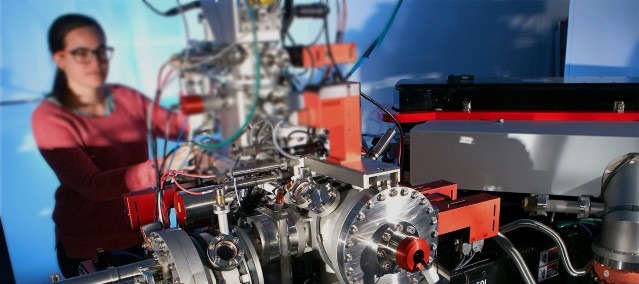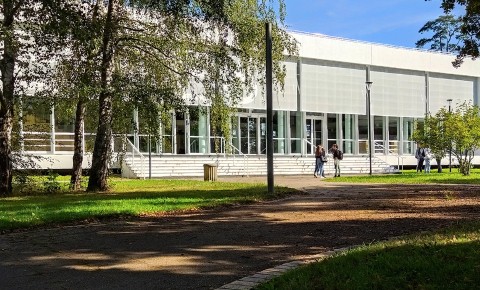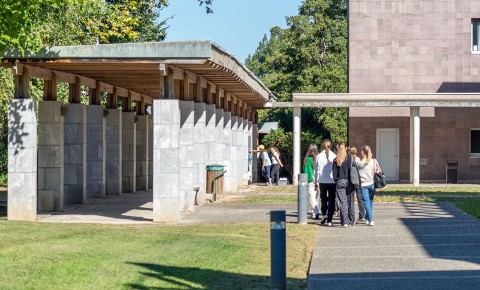
Graduate School for Energy and Environmental Innovation (GREEN)PhD-Track Program in Pau or Anglet
University of Pau and Pays de l’Adour’s Graduate Research School for Energy and Environmental Innovation (GREEN) opened in 2022. This PhD-track 5-year program of excellence aims to train tomorrow’s researchers in energy and the environment, so that they may propose innovative solutions.
Like other graduate research schools created in France since 2017, GREEN implements five-year programs of excellence combining a Master's degree and a PhD, in Pau or in Anglet.
The Honors students selected for GREEN Masters are all granted an annual stipend of 5,000 euros (Talents’ Academy), allowing them to focus on their studies.
Classes are taught in English, except for the ASSET Master’s in Sustainability Science (social sciences), which may include some courses in French.
Applications
- Non-resident and non-European students: from October 1 until Spring on the Études en France platform.
- Resident or European students: applications in February-March on the Mon Master platform.
The objectives of University of Pau’s Research Graduate School
- Providing research with highly qualified doctoral students and strengthening the university’s international attractiveness,
- Consolidating partnerships with companies through internships, doctoral theses, and involving businesses in training and in defining the curricula,
- Strengthening the master-doctorate research-innovation level of two of the colleges created within the framework of the I-SITE excellence label: STEE (Sciences and Technologies for Energy and the Environment) and SSH (Social Sciences and Humanities).
PhD-track Graduate Programs based on University of Pau’s strengths
The GREEN Research Graduate School houses PhD-track Graduate Programs focused on emerging or high-potential areas of research at UPPA (in Science and in Social Sciences & Humanities).
They rely on seven fundamental principles:
- Training in 5 years based on the skills of the university’s research centers,
- Guaranteeing professional integration at the end of the master's or doctorate,
- Going beyond the traditional disciplinary approaches,
- Developping a broad scientific culture on energy and environmental issues,
- Training through research from the Master's level onwards and guiding high-potential students towards a PhD,
- Cultivating multidisciplinary approaches,
- Promoting international experience.
It supports the 5 missions identified by UPPA that are directly linked to major societal issues:
- Organising energy subsidiarity on a regional scale,
- Reconciling development, environmental safety and protection of biodiversity,
- Representing and building the territories of tomorrow,
- Adapting coastal, forest and mountain ecosystems to make them more resilient,
- Questioning borders and taking up the challenge of differences.
Contact
GREEN Graduate School Co-directors
GREEN Graduate School Coordinator
This program is supported by the French National Research Agency as part of the Investments Program #3 / France 2030 (ANR-21-SFRI-0003)
7 programs
7 programs
Master Chemistry and Life sciences
Environmental protection and sustainable development have become societal major issues. It is now also acknowledged that we must take advantage of our expertise in physico-chemistry and microbiology…

Master Sustainability Science - Applied Social Sciences in Energy and Environmental Transitions (ASSET)
GREEN video presentation Global changes, climate change, and the biodiversity crisis have and will profoundly transform the ways in which economic and social actors act with respect to energy and the…
- GREEN Graduate Program - Master of Applied Social Sciences in Energy and Environmental Transitions (ASSET): Economics specialization (Brochure)
- GREEN Graduate Program - Master of Applied Social Sciences in Energy and Environmental Transitions (ASSET): Geography specialization (Brochure)
- GREEN Graduate Program - Master of Applied Social Sciences in Energy and Environmental Transitions (ASSET): Law specialization (Brochure)
- GREEN Graduate Program - Master of Applied Social Sciences in Energy and Environmental Transitions (ASSET): Sociology specialization (Brochure)

Master Mathematics and Applications
The program provides excellent training in many different areas of applied mathematics developed in the laboratory of Mathematics and Applications of Pau: MMS Program: PDE (partial differential…


